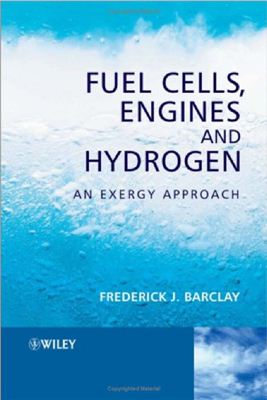John Wiley & Sons Inc., 2006. 200 p. ISBN:0-470-01904-2.
Fuel cell technology is the most exciting and legitimate alteative source of power currently available to us as world resources of non-renewable fuel continue to be depleted. No other power generating technology holds the same benefits that fuel cells offer, including high reliability and efficiency, negligible environmental impact, and security of supply. Fuel cells run on hydrogen – the simplest and most plentiful gas in the universe - although they can also run on carbon monoxide, methane, or even coal. Their applications are diverse, from powering automobiles, buildings and portable electronics, to converting methane gas from wastewater plants and landfills into electricity.
Fuel Cells, Engines and Hydrogen is a controversial text that challenges the accepted industry parameters for measuring fuel cell performance and efficiency. Based on his inter-disciplinary experience in the fields of power, nuclear power, and desalination, the author contends that the development potential of the fuel cell is related to the quantity fuel chemical exergy, which, like electrical potential, is a quantitative measure of work done. The fuel cell community currently characterises these devices in terms of the enthalpy of combustion (calorific value) – however the author argues a correct, qualitatively different and fourfold larger characterisation is via the fuel chemical exergy, in units of work, and not energy. He asserts that the distortion introduced by this accepted perspective needs to be corrected before relatively efficient fuel cells, integrated with comparatively low performing gas turbines, reach the market.
Fuel Cells, Engines and Hydrogen features a foreword by Dr Gerry Agnew, Executive VP Engineering of Rolls Royce Fuel Cells Systems Ltd. It is essential reading for all engineers involved with fuel cells and / or the manufacture of hydrogen from natural gas, as well as academics in related disciplines such as thermodynamics, physical chemistry, materials, physics, mechanical and chemical engineering.
Fuel cell technology is the most exciting and legitimate alteative source of power currently available to us as world resources of non-renewable fuel continue to be depleted. No other power generating technology holds the same benefits that fuel cells offer, including high reliability and efficiency, negligible environmental impact, and security of supply. Fuel cells run on hydrogen – the simplest and most plentiful gas in the universe - although they can also run on carbon monoxide, methane, or even coal. Their applications are diverse, from powering automobiles, buildings and portable electronics, to converting methane gas from wastewater plants and landfills into electricity.
Fuel Cells, Engines and Hydrogen is a controversial text that challenges the accepted industry parameters for measuring fuel cell performance and efficiency. Based on his inter-disciplinary experience in the fields of power, nuclear power, and desalination, the author contends that the development potential of the fuel cell is related to the quantity fuel chemical exergy, which, like electrical potential, is a quantitative measure of work done. The fuel cell community currently characterises these devices in terms of the enthalpy of combustion (calorific value) – however the author argues a correct, qualitatively different and fourfold larger characterisation is via the fuel chemical exergy, in units of work, and not energy. He asserts that the distortion introduced by this accepted perspective needs to be corrected before relatively efficient fuel cells, integrated with comparatively low performing gas turbines, reach the market.
Fuel Cells, Engines and Hydrogen features a foreword by Dr Gerry Agnew, Executive VP Engineering of Rolls Royce Fuel Cells Systems Ltd. It is essential reading for all engineers involved with fuel cells and / or the manufacture of hydrogen from natural gas, as well as academics in related disciplines such as thermodynamics, physical chemistry, materials, physics, mechanical and chemical engineering.

